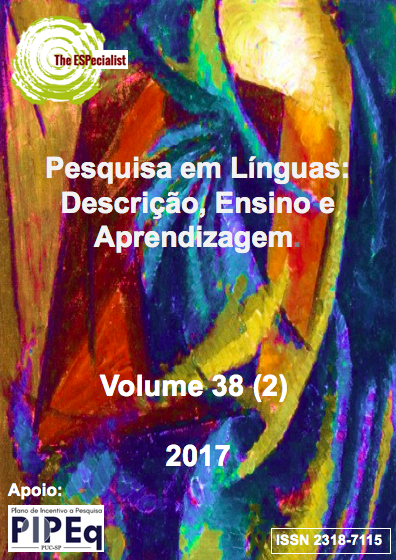PROFESSOR NATIVO: ISSO AJUDA NO APRENDIZADO DE INGLÊS COMO L2 PARA BRASILEIROS?
DOI:
https://doi.org/10.23925/2318-7115.2017v38i2a7Keywords:
professor nativo, segunda língua, aprendizado.Abstract
Neste artigo, o objetivo é identificar se cinco brasileiros que estudaram inglês no exterior (EUA e Inglaterra) com falantes nativos consideram que o aprendizado com um nativo inglês/americano é melhor apenas pela natividade do professor. A partir das comparações das razões delineadas pelos sujeitos poder-se-á concluir se o mito do “falante nativo como melhor professor de inglês para estudantes brasileiros” será confirmado ou refutado.References
COOK, V. J. 1999. Going beyond the native speaker in language teaching. TESOL Quarterly, v. 33, n. 2, p. 185-209.
DAVIES. A. 1991. The native speaker in applied linguistics. Edinburgh, Edinburgh University Press.
___________, 2003. The native speaker: myth and reality. Clevedon: Multilingual Matters,
____________, 2004. The Native Speaker in Applied Lingusticis. In DAVIES, A; ELDER, C (eds) The Handbook of Applied Linguistics. Blackwell, 2004.
PENNYCOOK, A. 1994. The cultural politics of English as an international language. London, Longman, 365 p.
RAJAGOPALAN, K. 1997.Linguistics and the myth of nativity: comments on the controversy over “new/non-native Englishes. Journal of Pragmatics, v. 27, p. 225-231.
_____________.2002. O conceito de identidade em linguística: é chegada a hora para uma reconsideração radical? In: I. SIGNORINI (Org.). Língua(gem) e identidade: elementos para uma discussão no campo aplicado. Campinas, São Paulo: Mercado de Letras, p. 21-45.
_____________. 2003. Por uma linguística crítica: linguagem, identidade e a questão ética. São Paulo: Parábola Editorial.
_____________. 2004a. Línguas Nacionais como Bandeiras Patrióticas, ou a linguística que nos deixou na mão. In: F. L. R. SILVA, K (Org.) A Linguística que nos faz falhar: Investigação Critica. Parabola Editorial, São Paulo, SP pgs. 11-37.
_____________. 2004b. The concept of “World English” and its implications for ELT. ELT Journal, v. 58, n. 2, p. 111-117.
SMITH, L. E.; NELSON, C. L. 2006. World Englishes and issues of intelligibility. In: b. Kachru et al. (org.) The handbook of World Englishes. Oxford: Blackwell Publishing, p. 428-445.
SOUTO FRANCO M. M. & ALMEIDA FILHO, J. C., 2009 O conceito de competência comunicativa em retrospectivas e perspectiva, Revista Desempenho, v. 11 p.6.
WIDDOWSON, H. G. Teaching Language as communication. Oxford: Oxford University Press, 1978.
Downloads
Additional Files
Published
How to Cite
Issue
Section
License
The authors grant the journal all copyrights relating to the published works. The concepts issued in signed articles are the absolute and exclusive responsibility of their authors.


 Esta obra está licenciada com uma Licença
Esta obra está licenciada com uma Licença 